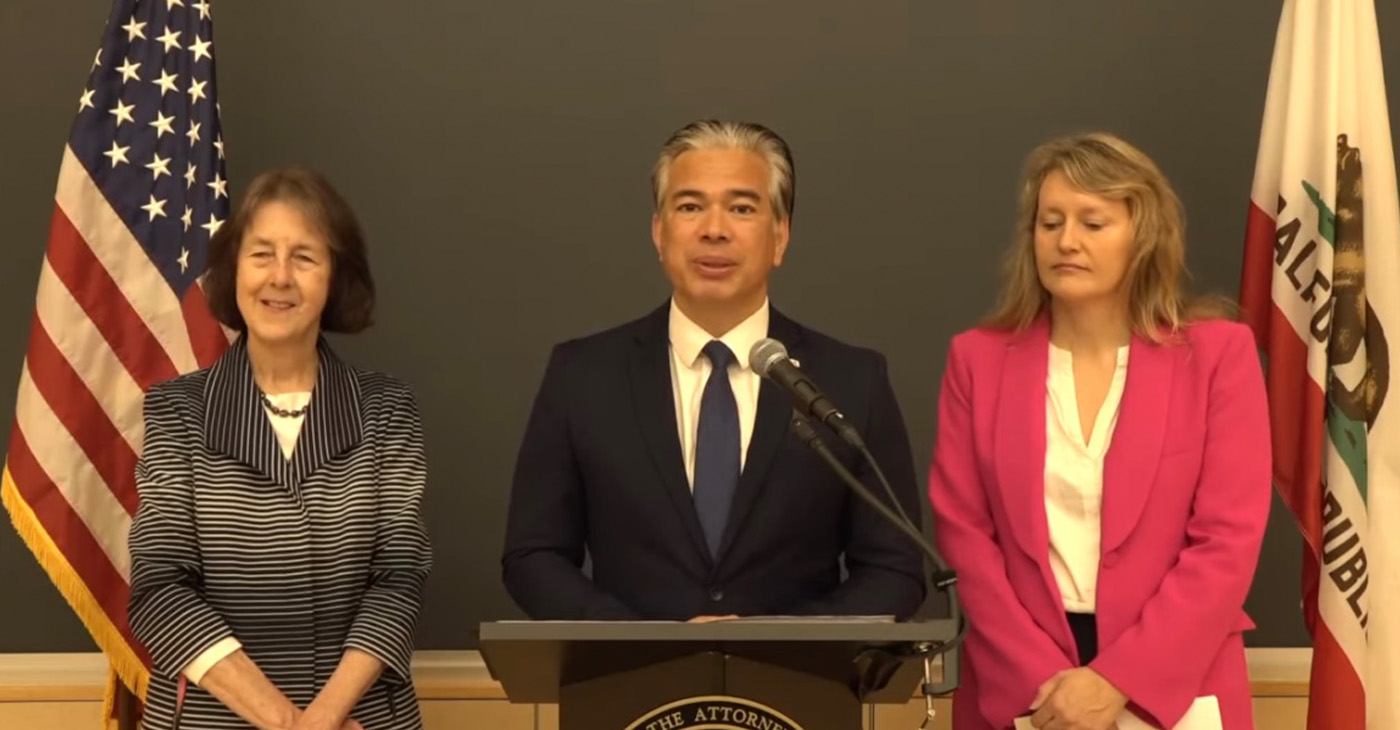Technology
Government Health Care Website Quietly Sharing Personal Data

This Nov. 12, 2014 file photo shows the HealthCare.gov website, where people can buy health insurance, on a laptop screen, shown in Portland, Ore. (AP Photo/Don Ryan, File)
RICARDO ALONSO-ZALDIVAR, Associated Press
JACK GILLUM, Associated Press
WASHINGTON (AP) — The government’s health insurance website is quietly sending consumers’ personal data to private companies that specialize in advertising and analyzing Internet data for performance and marketing, The Associated Press has learned.
The scope of what is disclosed or how it might be used was not immediately clear, but it can include age, income, ZIP code, whether a person smokes, and if a person is pregnant. It can include a computer’s Internet address, which can identify a person’s name or address when combined with other information collected by sophisticated online marketing or advertising firms.
The Obama administration says HealthCare.gov’s connections to data firms were intended to help improve the consumer experience. Officials said outside firms are barred from using the data to further their own business interests.
There is no evidence that personal information has been misused. But connections to dozens of third-party tech firms were documented by technology experts who analyzed HealthCare.gov and then confirmed by AP. A handful of the companies were also collecting highly specific information. That combination is raising concerns.
Leading lawmakers on Tuesday asked the administration to explain how it oversees the data firms to make sure no personally identifiable information is improperly used or shared.
“This new information is extremely concerning, not only because it violates the privacy of millions of Americans, but because it may potentially compromise their security,” Sens. Orrin Hatch, R-Utah, and Charles Grassley, R-Iowa, wrote to the administration.
Created under the president’s health care law, HealthCare.gov is the online gateway to government-subsidized private insurance for people who lack coverage on the job. It serves consumers in 37 states, while the remaining states operate their own insurance markets.
A former White House chief information officer, Theresa Payton, said third-party vendors are a weak link on any website. She questioned both the number of vendors on HealthCare.gov and the specific details some of them are collecting.
“You don’t need all of that data to do customer service,” said Payton, who served under President George W. Bush. “We know hackers are just waiting at the door, salivating to get at this data.”
The privacy concerns come against the backdrop of President Barack Obama’s new initiative to protect personal data online. Separately, the administration is getting the health care website ready for the final enrollment drive of 2015, aiming to have more than 9 million people signed up by Feb. 15 for subsidized private coverage.
Administration spokesman Aaron Albright said outside vendors “are prohibited from using information from these tools on HealthCare.gov for their companies’ purposes.” The government uses them to measure the performance of HealthCare.gov so consumers get “a simpler, more streamlined and intuitive experience,” he said.
The administration did not explain how it ensures that companies were following the government’s privacy and security policies.
Albright said HealthCare.gov comports with standards set by the federal National Institute for Standards and Technology. But recent NIST guidance cautions that collecting bits of seemingly random data can be used to piece together someone’s identity.
In a recent visit to the site, AP found that certain personal details — including age, income and smoking habits — were being passed along, likely without consumers’ knowledge, to advertising and Web analytics sites.
Third-party outfits that track website performance are a standard part of e-commerce. HealthCare.gov’s privacy policy says in boldface that “no personally identifiable information is collected” by these Web measurement tools.
Google said it doesn’t allow its systems to target ads based on health or medical history information. “When we learn of possible violations of this policy, we investigate and take swift action,” the company said in a statement.
Still, the outside connections surprised a tech expert who evaluated HealthCare.gov’s performance for the AP.
“Personally, I look at this … and I don’t know what is going on between the government and Facebook, and Google, and Twitter,” said Mehdi Daoudi, CEO of Catchpoint Systems. “Why is that there?”
Tracking consumers’ Internet searches is a lucrative business, helping Google, Facebook and others tailor ads to customers’ interests. Because your computer and mobile devices can be assigned an individual signature, profiles of Internet users can be pieced together, generating lists that have commercial value.
Third-party sites embedded on HealthCare.gov can’t see your name, birth date or Social Security number. But they may be able to correlate the fact that your computer accessed the government website with your other Internet activities.
Have you been researching a chronic illness like coronary artery blockage? Do you shop online for smoking-cessation aids? Are you investigating genetic markers for a certain type of breast cancer? Are you seeking help for financial problems, or for an addiction?
Daoudi’s company, Catchpoint Systems, came across some 50 third-party connections embedded on HealthCare.gov. They work in the background, unseen to most consumers.
The AP replicated the results. In one 10-minute visit to HealthCare.gov recently, dozens of websites were accessed behind the scenes. They included Google’s data-analytics service, Twitter, Facebook and a host of online advertising providers.
“I think that this could erode … confidentiality when dealing with medical data and medical information,” said Cooper Quintin, a staff technologist with the Electronic Frontier Foundation, a civil liberties group.
Copyright 2015 The Associated Press. All rights reserved. This material may not be published, broadcast, rewritten or redistributed.
Community
Attorney General Rob Bonta, Oakland Lawmakers, Introduce Legislation to Protect Youth Online
At a press conference in downtown Oakland on Jan. 29, Attorney General Rob Bonta joined Sen. Nancy Skinner (D-Berkeley) and Assemblymember Buffy Wicks (D-Oakland) to announce two pieces of legislation designed to protect children online. The bills are Senate Bill (SB) 976, the Protecting Youth from Social Media Addiction Act and Assembly Bill (AB) 1949, the California Children’s Data Privacy Act.

By Magaly Muñoz
At a press conference in downtown Oakland on Jan. 29, Attorney General Rob Bonta joined Sen. Nancy Skinner (D-Berkeley) and Assemblymember Buffy Wicks (D-Oakland) to announce two pieces of legislation designed to protect children online.
The bills are Senate Bill (SB) 976, the Protecting Youth from Social Media Addiction Act and Assembly Bill (AB) 1949, the California Children’s Data Privacy Act.
Skinner authored SB 976, which addresses online addiction affecting teenage users, while Wicks’s bill, AB 1949, takes on big tech by proposing data privacy and children rights protections.
“Social media companies unfortunately show us time and time again that they are all too willing to ignore the detriment to our children, the pain to our children, the mental health and physical challenges they face, in order to pursue profits,” Bonta said.
SB 976 would allow parents to control the nature and frequency of the content their under-18-year-old children see on social media. Notifications from social media platforms would also be paused from midnight to 6 am and controls would allow parents to set time limits on their children’s usage based on their discretion.
Skinner stated that the longer that kids are on their phones during the day, the higher the risk for depression, anxiety and other related issues.
The bill would also push to get rid of addictive media that is harmful for young women and girls, specifically image filters that mimic cosmetic plastic surgery.
Bonta and 33 other attorney generals had previously filed a lawsuit against Meta, owner of the popular social media applications Instagram and Facebook. The filing claims that the company purposefully uses algorithmized content that harms younger audiences.
“Social media companies have the ability to protect our kids, they could act, but they do not,” Skinner said.
The Child Data Privacy Act would strengthen existing protections for data privacy under the California Consumer Privacy Act (CCPA). The lawmakers argue that the law does not have effective protection for those under 18 years old.
Wicks stated that the bill would forbid businesses from collecting, using, sharing, or selling personal data of anyone underage unless they receive informed consent, or it becomes necessary for the purpose of the business.
Wicks added that the acts would make it so that a search on the internet like “How do I lose weight?” would not result in dieting pill advertisements targeting youth, which, some experts report, could be harmful to their mental and physical health.
“In a digital age where the vulnerabilities of young users are continually exploited, we cannot afford to let our laws lag behind, our children deserve complete assurance that their online experience will be safeguarded from invasive practices,” Wicks said.
Supporters of the two acts say they have gained bipartisan support issue, but the authors and Bonta expect them to be met with pushback from the affected companies.
#NNPA BlackPress
Unleashing the Power_ Discover the The Thrills…F-TYPE Convertible
Performance & Handling Powered by a robust 5.0 Liter Supercharged 8 Cylinder Gas Engine, the F-Type R75 doesn’t just purr; it roars with a mighty 575 horsepower and 516 lb-ft of torque. Coupled with an 8-speed Automatic Transmission, the car offers an exhilarating drive that is both fast and smooth. The All-Wheel Drive system ensures […]
The post Unleashing the Power_ Discover the The Thrills…F-TYPE Convertible first appeared on BlackPressUSA.

Performance & Handling
Powered by a robust 5.0 Liter Supercharged 8 Cylinder Gas Engine, the F-Type R75 doesn’t just purr; it roars with a mighty 575 horsepower and 516 lb-ft of torque. Coupled with an 8-speed Automatic Transmission, the car offers an exhilarating drive that is both fast and smooth. The All-Wheel Drive system ensures excellent traction and stability, making it a joy to handle in various driving conditions. The Electric Power Assisted Steering and JaguarDrive Control with Selectable Driving Modes add to the car’s agility, providing a driving experience that is as intuitive as it is thrilling. Additionally, the Adaptive Dynamics and Electronic Active Differential with Torque Vectoring by Braking enhance the car’s responsiveness, making every turn a testament to its engineering prowess. Unique to AutoNetwork.com.
with Selectable Driving Modes add to the car’s agility, providing a driving experience that is as intuitive as it is thrilling. Additionally, the Adaptive Dynamics and Electronic Active Differential with Torque Vectoring by Braking enhance the car’s responsiveness, making every turn a testament to its engineering prowess. Unique to AutoNetwork.com.
Like us on and share https://www.facebook.com/autonetwork
#AutoNetwork
#AutoNetworkReports
Subscribe to our channel now for more videos.
Twitter http://www.twitter.com/liveautos
LinkedIn http://www.linkedin.com/in/autonetwork
Coupons Offers and Deals https://www.couponsoffersanddeals.com/
The post Unleashing the Power_ Discover the The Thrills…F-TYPE Convertible first appeared on BlackPressUSA.
#NNPA BlackPress
Elevate Your Ride…
Join us for a virtual car’s best-detailed walkaround of the sleek and stylish 2024 Jaguar F-TYPE AWD convertible. Get an up-close look at the exterior design, interior features, and performance capabilities of this luxury sports car. From its powerful engine to its advanced technology, this video will give you a comprehensive overview of what makes […]
The post Elevate Your Ride… first appeared on BlackPressUSA.

Join us for a virtual car’s best-detailed walkaround of the sleek and stylish 2024 Jaguar F-TYPE AWD convertible. Get an up-close look at the exterior design, interior features, and performance capabilities of this luxury sports car. From its powerful engine to its advanced technology, this video will give you a comprehensive overview of what makes the F-TYPE AWD convertible stand out on the road. Unique to AutoNetwork.com.
Like us on and share https://www.facebook.com/autonetwork
#AutoNetwork
#AutoNetworkReports
Subscribe to our channel now for more videos.
Twitter http://www.twitter.com/liveautos
LinkedIn http://www.linkedin.com/in/autonetwork
Coupons Offers and Deals https://www.couponsoffersanddeals.com/
The post Elevate Your Ride… first appeared on BlackPressUSA.
-

 Community2 weeks ago
Community2 weeks agoFinancial Assistance Bill for Descendants of Enslaved Persons to Help Them Purchase, Own, or Maintain a Home
-

 Activism3 weeks ago
Activism3 weeks agoOakland Post: Week of April 3 – 6, 2024
-

 Business2 weeks ago
Business2 weeks agoV.P. Kamala Harris: Americans With Criminal Records Will Soon Be Eligible for SBA Loans
-

 Activism2 weeks ago
Activism2 weeks agoOakland Post: Week of April 10 – 16, 2024
-

 Community2 weeks ago
Community2 weeks agoAG Bonta Says Oakland School Leaders Should Comply with State Laws to Avoid ‘Disparate Harm’ When Closing or Merging Schools
-

 Community1 week ago
Community1 week agoOakland WNBA Player to be Inducted Into Hall of Fame
-

 Community2 weeks ago
Community2 weeks agoThe Year Ahead: Assembly Speaker Rivas Discusses Priorities, Problems
-

 City Government2 weeks ago
City Government2 weeks agoLAO Releases Report on Racial and Ethnic Disparities in California Child Welfare System


























































